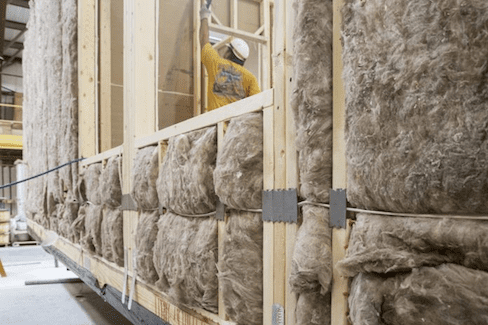What is the Best Type of Insulation for Winterizing Southern Mobile Homes?

Winterizing a Southern mobile home requires careful consideration, especially since mobile homes are often more vulnerable to temperature fluctuations due to their construction. In areas like Florida, where winters can be mild but still chilly, proper insulation becomes essential to maintain a comfortable indoor temperature while keeping energy costs down. The right insulation helps prevent heat loss, reduces drafts, and ensures that your heating system operates efficiently, even during the cooler months.
If you own a mobile home and want to ensure your home is prepared for the winter, understanding the best types of insulation is key. In this blog, we’ll explore the most effective insulation options for winterizing your Southern mobile home and how you can improve energy efficiency, comfort, and savings.
Why Insulate Your Mobile Home?
Mobile homes are typically constructed with lighter materials than traditional homes, which means they often lack the same level of insulation. This can make them more prone to heat loss during the winter months. Poor insulation in your mobile home can lead to uncomfortable cold drafts, higher utility bills, and excessive strain on your heating system.
When your mobile home isn’t properly insulated, your HVAC system has to work overtime to maintain a comfortable temperature, consuming more energy and driving up your utility costs. The good news is that with the right insulation, you can reduce the workload of your HVAC system, improve comfort, and lower your energy bills.
Insulation Needs for Southern Mobile Homes
Southern mobile homes typically experience mild winters compared to other parts of the country, but they can still get chilly, especially during the evenings and early mornings. Mobile homes are often built with a limited amount of insulation, which is why investing in additional insulation is a good idea for improving energy efficiency.
In addition to providing warmth, proper insulation in your mobile home can help keep cool air inside during the summer months. This is especially important in the South, where hot temperatures persist for much of the year. Insulating your home ensures that you maintain a comfortable environment year-round without the need to constantly adjust your heating and cooling system.
Types of Insulation for Winterizing Southern Mobile Homes
There are several types of insulation options available to mobile homeowners. The best type of insulation depends on factors like your home’s construction, your budget, and the level of insulation already present. Below, we’ll discuss the most common types of insulation used to winterize Southern mobile homes.
1. Fiberglass Batt Insulation
Fiberglass batt insulation is one of the most common insulation types used in mobile homes. It is made of spun glass fibers that trap air and provide thermal resistance, making it a good option for areas like walls, attics, and floors. It’s relatively easy to install, making it a popular choice for DIY projects.
Fiberglass batt insulation is cost-effective and widely available, but it does have its limitations. It can be difficult to install in tight spaces, and it may not provide the best air sealing. Gaps and compressed areas can reduce their overall effectiveness. Additionally, fiberglass batt insulation can be irritating to the skin and lungs, so proper protective gear is necessary during installation.
2. Spray Foam Insulation
Spray foam insulation is a more advanced and effective option for mobile homes. It is applied as a liquid that expands to fill gaps, cracks, and voids, forming a solid, airtight barrier. Spray foam insulation is highly efficient at sealing gaps and preventing air leaks, making it ideal for areas where air infiltration is a concern, such as in walls, attics, and crawl spaces.
Spray foam provides excellent thermal resistance, which helps to keep your mobile home warm during winter and cool during summer. It also helps to prevent moisture buildup, which can lead to mold and mildew growth. Although spray foam insulation can be more expensive than fiberglass batt, its superior performance and air-sealing capabilities make it a worthwhile investment for many mobile homeowners.
There are two main types of spray foam insulation:
- Open-cell spray foam: This type of foam has a soft, spongy texture and is best suited for areas with more moderate insulation needs.
- Closed-cell spray foam: This type has a denser structure and offers better insulation performance, especially in areas that are exposed to moisture.
Spray foam insulation is particularly beneficial for winterizing your mobile home, as it minimizes heat loss and prevents drafts, ensuring a cozy and energy-efficient living environment.
3. Cellulose Insulation
Cellulose insulation is made from recycled paper products and treated to resist fire and pests. It is commonly used for insulating attics, walls, and floors. Cellulose insulation can be blown into spaces, making it an excellent option for filling gaps in existing insulation. It has a high R-value, meaning it provides good thermal resistance and can help keep your mobile home warm during the winter months.
One of the main advantages of cellulose insulation is its eco-friendliness, as it is made from recycled materials. It also has a higher density compared to fiberglass, providing better soundproofing and air-sealing properties. However, cellulose insulation can settle over time, so it may need to be topped off or reapplied periodically.
4. Reflective or Radiant Barrier Insulation
In areas with hot summers and mild winters, radiant barrier insulation can be particularly effective. It is often used in attics to reflect heat away from the home, keeping the interior cooler in the summer. During the winter, radiant barrier insulation works by preventing heat from escaping through the roof, which can help keep your mobile home warmer.
Radiant barriers are typically installed in attics and are made of a reflective material that reflects radiant heat away from your home. Although radiant barriers are more effective in warmer climates, they can still offer benefits during the winter by helping to retain heat.
5. Foam Board Insulation
Foam board insulation is a rigid insulation material commonly used in floors, walls, and foundations. It provides good thermal resistance and is relatively easy to install. Foam board insulation is lightweight, moisture-resistant, and durable, making it an excellent option for winterizing your mobile home.
One of the benefits of foam board insulation is that it provides continuous insulation, which reduces the likelihood of air leaks. It can be used in combination with other insulation types for maximum efficiency.
How Koala Insulation of St. Petersburg Can Help
When it comes to winterizing your Southern mobile home, the right insulation can make all the difference. At Koala Insulation of St. Petersburg, we specialize in providing high-quality insulation solutions that are tailored to your home’s unique needs. Whether you choose spray foam, fiberglass batt, cellulose, or any other insulation option, our team can help you select and install the best type of insulation for your mobile home.
Our experts will assess your home’s insulation requirements and recommend the most energy-efficient solutions to ensure your mobile home stays comfortable all year long. We are committed to helping homeowners improve their energy efficiency, reduce utility bills, and create a more comfortable living space.
Conclusion
Winterizing your Southern mobile home with the right insulation is essential for maintaining comfort and reducing utility costs during the colder months. The best type of insulation for your mobile home depends on factors like your budget, the structure of your home, and the level of insulation you already have.
Whether you choose fiberglass batt insulation, spray foam, cellulose, or another option, Koala Insulation of St. Petersburg can help you make the right choice for your home. Contact us today at (727) 416-6702 or visit our website for a free estimate. Let us help you improve your mobile home’s energy efficiency and keep your home comfortable throughout the winter season!
Find Your Location


Get a quote


